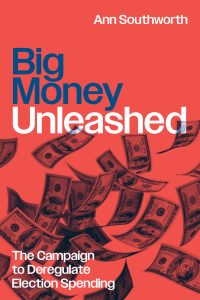Five Questions with Ann Southworth author of “Big Money Unleashed: The Campaign to Deregulate Election Spending”

While the American public prepares for the 2024 Presidential Election, large questions about the state of American democracy loom large. As important debates about the country’s future abound, let’s discuss some of the history that shaped our current political landscape.
In Big Money Unleashed, law professor Ann Southworth examines how the First Amendment became an obstacle to campaign finance regulation—a history that began much earlier than most imagine. With US citizens headed towards the voting booths come fall, Big Money Unleashed charts how we got here in the first place and what the insidious relationship between protected rights, money, and elections means for our country’s future.
In this post, we chat with Ann about her research and the milestone events that paved the way for money to further infiltrate election campaigns.
While you were working on this project, what did you learn that surprised you the most?
I was amazed to learn about the origins of the idea that election spending is constitutionally protected speech. The First Amendment does not mention campaign finance; it provides that “Congress shall make no law . . . abridging the freedom of speech.” Bringing election spending within the First Amendment’s coverage was the work of creative lawyers, beginning fifty years ago.
The primary architect of the foundational legal theories was Ralph Winter, a conservative Yale Law School professor (and later faculty advisor to the first chapter of the Federalist Society), who wrote two influential pamphlets published by the American Enterprise Institute while Congress was considering campaign finance legislation in the early 1970s. Winter received assistance from John Bolton, who was one of Winter’s law students. (This is the same John Bolton who later served as US ambassador to the United Nations, from 2005 to 2006, and as President Trump’s national security adviser from 2018 to 2019.) Winter and Bolton refashioned and extended doctrine protecting political dissenters so that it would also cover campaign contributions and expenditures by wealthy individuals and institutions. The pamphlets asserted that limits on campaign contributions and expenditures are, in effect, constraints on political expression and cannot be “distinguished from a law forbidding speech of over 10 minutes in public parks.” In response to potential objections about the unequal distribution of the resource that facilitates this “speech,” they claimed that money is indistinguishable from other types of resources that influence elections and are unequally distributed in society, such as free time and celebrity. Regulating money but not volunteer services or fame, they said, would amount to discriminating against wealthy people. The pamphlets also suggested that proponents of campaign finance regulation were elites who controlled the political process and mistrusted voters’ ability to discern their own interests.
The arguments advanced in those pamphlets laid the foundations for the litigation campaign described in my book, and they have served ever since as key points stressed by opponents of campaign finance regulation. Those theories are now embedded in the Supreme Court’s campaign finance decisions, including the most famous of them, Citizens United v. FEC (2010), which held that corporations and unions have a First Amendment right to spend unlimited amounts of money in federal candidate elections, provided that those expenditures are independent of the candidate’s campaign.
How did the First Amendment become a major obstacle to regulating big money in politics?
Supreme Court justices obviously played key roles in developing this law. But my book emphasizes the contributions of “nonjudicial” participants—lawyers, advocacy organizations, patrons, and networks.
The story begins in the 1970s when entrepreneurial lawyers (including Winter and Bolton) developed legal theories and brought challenges to campaign finance regulations. They received support from wealthy individuals of the political left and right who wanted greater freedom to use their money in elections and from politicians who wanted that financial backing. The effort gathered steam in the 1990s and early 2000s as opponents of regulation established specialized groups to challenge restrictions, recruited plaintiffs, and introduced and reworked ideas to unite disparate groups and constituencies (or at least the lawyers for these groups and constituencies) around the idea that regulating campaign spending amounts to censoring political expression. These specialized groups led the way in advancing this theme and chipping away at campaign finance restrictions, using an incremental litigation strategy pioneered by the NAACP Legal Defense Fund to dismantle racial segregation. Opponents of regulation tapped into legal mobilizing around abortion, guns, and Tea Party activism, as well as rising populist mistrust of elites. The Federalist Society’s Free Speech and Election Law Practice Group served as a site for cultivating arguments and coordinating amicus participation. The effort attracted partial support from some civil libertarian and labor groups. Kentucky Senator Mitch McConnell also played an important role: he led Republican opposition to legislation; assembled teams of lawyers to challenge campaign finance laws; recruited FEC commissioners who shared his opposition to regulating campaign finance; and oversaw the appointment of federal judges who were receptive to this deregulatory agenda (and other Republican priorities).
How did you become interested in this topic?
My interest in this topic grew out of research for another book, Lawyers of the Right, a group portrait of the lawyers active in the conservative legal movement. That book explored the role of lawyer networks in generating ideas necessary to change law, cultivating credibility for those ideas, pursuing law reform campaigns modeled on those of public interest law groups of the political left, and building litigation alliances. It also considered the challenges of managing deep differences in the policy priorities of the primary constituencies of the conservative legal movement. These constituencies mostly avoided direct conflict with one another in Supreme Court litigation during the period covered by my research, but they generally did not actively assist one another. Campaign finance regulation was an exception; organizations linked with all the major constituencies of the Republican coalition joined together on the same side of litigation challenging the 2002 Bipartisan Campaign Reform Act (a.k.a., McCain-Feingold). I found it puzzling that social conservatives assisted in a battle that seemed likely to benefit primarily wealthy individuals and corporations, perhaps even at the expense of the more populist elements of the Republican alliance. That curious phenomenon was the impetus for the research that eventually led to Big Money Unleashed.
As the 2024 Presidential election draws near, what should citizens be more cognizant of in terms of the campaigns they either do or do not support?
People should be aware that the recent influx of big money in American elections is partly a function of Supreme Court rulings on the constitutionality of campaign finance regulations. Those rulings, in turn, are the product of a long-term effort to shape First Amendment law. The Roberts Court’s campaign finance decisions have unleashed billions in election spending by super PACs and other politically active groups. Much of that spending is “dark”—meaning that the identities of large donors who seek to influence elections and elected officials through these entities are not disclosed to the public. The decisions have also emboldened campaigns to disregard existing laws and to test their boundaries.
What do you most hope readers will take away from your book?
I hope readers will take away a better sense of the process and players behind the creation of constitutional law in this one very important area of constitutional law. There was nothing inevitable about how those actors and resources came together to create new laws, and there was nothing inevitable about the doctrine that resulted from this effort. The same is also true of other areas of constitutional law in which we’ve seen major changes over the past several decades—including guns, affirmative action, abortion, the reach of anti-discrimination laws, and much more.

Ann Southworth is professor of law and codirector of the Center for Empirical Research on the Legal Profession at the University of California, Irvine.
Big Money Unleashed is available from our website or your favorite bookseller.